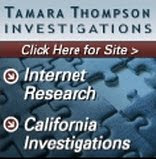A private investigator's surveillance for an insurance company does
not constitute harassment under the state's anti-stalking law, the Michigan
Supreme Court ruled Tuesday. Read the full story
The Court of Appeals' ruling included this analysis of the state stalking statute:
The civil stalking statute, MCL 600.2954, creates a civil cause of action for victims of stalking as defined by the criminal stalking statute, MCL 750.411h, regardless whether the alleged stalker is charged or convicted under the equivalent criminal stalking statute. According to MCL 750.411h(1)(d), "stalking" is the "wilful course of conduct involving repeated or continuing harassment of another individual that would cause a reasonable person to feel terrorized, frightened, intimidated, threatened, harassed, or molested and that actually causes the victim to feel terrorized, frightened, intimidated, threatened, harassed, or molested." The term "harassment" as used in subsection 411h(1)(d) is defined as:
. . . conduct directed toward a victim that includes, but is not limited to, repeated or continued unconsented contact that would cause a reasonable individual to suffer emotional distress and that actually causes the victim to suffer emotional distress. Harassment does not include constitutionally protected activity or conduct that serves a legitimate purpose. [MCL 750.411h(1)(c).] {Emphasis is mine.}
You have to wonder what planet the Court of Appeals was on when it determined that the surveillance was NOT serving a legitimate purpose. Here's some more of the Appeals Court's insightful conclusions:
After the first surveillance was thwarted when plaintiff made it clear that he did not consent to being followed by Conley, Conley nonetheless continued to appear within plaintiff’s sight until the police arrived. Once plaintiff detected Conley and Stovall in the second and fourth surveillances, a question of fact arose with respect to whether their continued appearance in his sight were unconsented contacts for purposes of the civil stalking claim. {Emphasis is mine.}
This made me laugh. How do these judges think we accomplish legitimate investigative goals when the subject is an adversary of our client? Walk up to him and say, "excuse me, I would like your consent to gather evidence that may undermine your claim"?
Thankfully the Michigan Supreme Court displayed better reasoning powers.
Now, that was easy! Private investigators are being challenged in courts and legislatures in our pursuit of information through gathering documents and in observing human activity. This is where the demand for privacy rights has gotten out of hand. Private investigators are not observing for idle curiosity. We perform information gathering in legal cases for the purpose of establishing the legitimacy of a claim, not to intrude or make contact that creates emotional distress. But that hasn't stopped the litigious!We conclude that surveillance by licensed private investigators that contributes to the goal of obtaining information, as permitted by the Private Detective License Act, MCL 338.822(b)(i)-(v), is conduct that serves a legitimate purpose.




